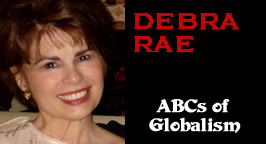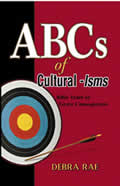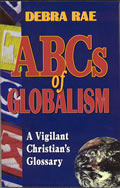TODAY'S
TACTICAL PURSUIT OF RELIGIOUS COMMONALITY
PART 1
By
Debra Rae
July 30, 2011
NewsWithViews.com
Exclusionism, Pluralism, Inclusionism
It’s said that “if words are to enter men’s minds and bear fruit, they must be the right words shaped cunningly to pass men’s defenses and explode silently and effectually within their minds” (J. B. Phillips). While the fruit of fitly spoken words is sweet, opportunists also use cunningly devised terms to shroud their own provocative agendas that, in the end, bear rotten fruit.[1]
For instance, universally agreeable twenty-first century buzzwords as “transformation,” “transcendence,” and “collaboration” may appeal broadly, but their generic meanings obscure widespread grasp of how they’d look if acted out in real time. By definition, globalism is an interdependent, worldwide design with geopolitical, economic, and spiritual components.
For the transformative “Grand Design” of collaborative globalism to be realized, national sovereignty, free enterprise capitalism, and biblical fundamentalism must give way to bio-regional global governance, sustainability (wealth redistribution), and syncretism (doctrinal mix). Personal and/or group identities must defer to the Global Village in which populations are controlled and private ownership of property is curtailed.[2]
Because religionists of all colors dominate the global population, and religious passion serves as a tremendous boost to (or threat against) democratic transnationalism, globalists work to build bridges of commonality between Eastern and Western belief systems. More often than not, in today’s emerging one-world paradigm, fundamental Western values bow to collectivist counterparts, many of which originate in the East. Purportedly for “the common good,” compliant world citizens submit to a new earth, pan-religious ethic, rather than to traditional mores.[3]
Tactical Pursuit of Commonality via Changeover, Commendation, Confusion
Religious commonality is accomplished by hawking politically correct diversity, popularly touted as “tolerance,” and by merging and thereby morphing traditional faith systems into oblivion. Among the world’s religionists are exclusivists, pluralists, and inclusionists.
Exclusivists adhere to one true and nonnegotiable path to salvation or liberation. Globalists finger fundamentalism as counterproductive to the burgeoning novus ordo seclorum (“new secular world order of the ages”) and instead favor doctrinal mix (syncretism) over dogma. Scripted “dialogue” encourages changeover to alternatives more amenable to the one-world plan.
Next, pluralists believe in many paths to salvation or liberation, none of which reigns supreme. If you follow Buddhist practices, for instance, you ostensibly get to Buddhist heaven; and if you follow Muslim practices, you get to Muslim paradise. For this reason, it’s assumed that I’m okay; you’re okay; and so is everyone else. Hence, there’s no need for conversion. Globalists promote and placate pluralists as especially useful; predictably, they commend pluralism for “tolerance” (more accurately, for malleability).
Finally, inclusionists believe in many paths to salvation or liberation; however, in the end, a seeker will naturally come to realize “the superior path.” Proponents recognize, identify with and, then, downplay religious differences by recasting them as similar or by trivializing them as superfluous “side issues.”[4]
The Chrislam Con
Viewed by many as its chief obstacle, well-established religious creed must be softened in order to realize the new, one-world order. With a mind to reset religious canon, globalists introduce confusion simply by merging disparate faith systems. This brand of inclusionism particularly appeals to nominal Christians who are more committed to “tolerance” than they are to biblical truth. As was the case with Eve, the loaded question “Hath God said?” gives them pause. In the name of “diversity,” these swap out the proverbial waistband of sound doctrine with the loose elastic of comfy compromise.
Recently, the Memorial Drive Presbyterian Church, Houston, joined Christian communities in Atlanta, Seattle, and Detroit to encourage “ecumenical reconciliation” between Christianity and Islam. Theirs was a sort of worldview potpourri mixing together elements of Christianity with Islam. Predictably called Chrislam, this brand of inclusive ecumenicalism qualifies mutually inharmonious texts—ie., Bible and Qur’an—as divinely inspired.[5]
In turn, when common ground is reached between Islamists and Buddhists, the result is called Buddlam; similarly, syncretizing Islamic doctrine with Hindu beliefs produces what’s called Hindlam. All three dilute the essence of their respective belief systems.
Buddhist-Islamic Dialogue
In 1996 a conference called Alternative Politics for Asia convened in Penang, Malaysia, in order to spark Buddhist-Muslim dialogue. By lassoing traditional “wisdom” and spiritual values of both world religions, and by merging them into a muddied mix of contradicting religious ideals, participants hoped, albeit unsuccessfully, to solve regional problems—namely, intergroup violence, armed conflicts, global warming, environmental degradation, and drug abuse.[6]
Thereafter, in June of 2006, the Dusit Declaration likewise fostered harmonious relations essentially by weakening Western free enterprise capitalism and muting biblical ethic that supports it—e.g., respect for rule of law, individual effort, and fair dealing.[7] The Declaration concluded: “The hegemonic power of global capitalism is the new ‘religion’ which threatens to undermine the universal, spiritual and moral values and world views embodied in Buddhism, Islam and other religions.”
Adding: This is why “Buddhists, Muslims and others should forge a more profound unity and solidarity, which will be able to offer another vision of a just, compassionate and humane universal civilization [devoid of biblical ethic, of course]. It is with this mission in mind that we hereby announce the launch of a permanent Buddhist-Muslim Citizens Commission for Southeast Asia.”[8]
Dalai Lama, Leading the Pack
The key proponent for this trendy splurge of merge is His Holiness, the Fourteenth Dalai Lama who contends that sustainable development (even survival) depends on nations, cultures, religions, and individuals sharing responsibility for solving universal problems (seductive, yes; transparent, no).[9]
Here’s the caveat: The Dalai Lama defends Islam, not by relaying its ostensibly admirable tenets, but rather by “reshaping people’s views of the religion.” Instead of characterizing Islam as purveyor of contact, conflict, conquest, and condescension, he simply ignores the Islamic Doctrine of Abrogation in an effort to “reshape” perception of Islam into a religion of peace and goodwill. To reject his religious renovation is to be “divisive.”[10]
To the one-world crowd, an ounce of divisiveness is worth a pound of rehab. For example, while on a lecture tour, Israeli journalist and Jewish theologian Avi Lipkin was sentenced in accordance with Swiss anti-racism law. Why? For concluding that “minarets are not church towers,” but they are “nails in the coffin of the West.” Rather than submit to re-education in some mosque (touted as “community service”), Avi instead preferred a jail sentence for his supposedly heinous crime of being politically incorrect.[11]
HRH Prince Ghazi bin Muhammad of Jordan, on the Bandwagon
On 12 May 2010 the Dalai Lama joined a panel of select scholars who together launched the Common Ground Project. The project was planned over several years by HRH Prince Ghazi bin Muhammad of Jordan who, along with the Dalai Lama, set out to nurture spiritual relationship between their respective faith traditions.
Never mind that core beliefs of Buddhism and Islam clash irreconcilably. For instance, Buddha never admitted to being “god,” nor do Buddhists recognize any god, period. In contrast, fundamental belief in Islam (shahada) recognizes no god but Allah, whose messenger is Muhammad and whose acceptance is mandatory, whether voluntarily or, if need be, by force.
Dhimma status, as relating to the Pact of Umar, purportedly protects Christians and Jews who live in covenant with their Muslim conquerors. For Islamists, the historical concept of “people of the Book” seems to have widened from monotheistic religions, as these, to include Buddhism. Three decades after the Prophet, Buddhists received dhimmi status.
For following ethical principles of higher authority, conquered Buddhists were allowed to follow their religion as long as laypeople among them joined Jews and Christians in submitting to burdensome restrictions and in paying poll taxes from which Islamists are exempt.
Far from fostering goodwill, Islamists vilify non-Muslims as hated dar-al-bughd. According to the Hadith, the Prophet characterized the majority of hell-fire’s dwellers as ungrateful women. Attitudes, as these, hardly lend themselves to conciliation.[12]
“Shipwrecked by the Laughter of the Gods”
Nevertheless,
the Dalai Lama persists in stressing interfaith cooperation. After all,
he reasons, everyone wishes to be happy and not to suffer; and the entire
world is interdependent, is it not?
While understandings, as these, ring true in a very general sense, they
fail to flesh out the essence of core belief systems.
The Dalai Lama argues further that, if you truly believe your religion comes from God, you’re obliged to accept that He created others as well; but I disagree. As Albert Einstein once reasoned, “Whoever undertakes to set himself up as a judge of Truth and Knowledge is shipwrecked by the laughter of the gods.”
| Subscribe to the NewsWithViews Daily News Alerts! |
Speaking of which, mythology teaches us well that “the gods” are loathe to yield their respective domains—e.g., for the kingship of the gods, Zeus challenged Cronus to war. Today’s pantheon of gods is no different. No amount of wishing, hoping, dreaming, and scheming will deter Allah’s followers from their headstrong bid for global dominance.
Though trendy, today’s syncretism is not the stuff religious “harmony” and “solidarity” are made of; and truth is never subject to my belief or yours. It’s the very essence of God Himself. Neither time, nor cultures, nor preferences, nor ideologies, nor clever tactics can redefine or distil truth. It simply is.[13]
More to follow in Part 2.
Footnotes:
1.
Quotes
about Cunning
2.
Thomas Horn. “Globalism: Utopian Dream or Luciferic Nightmare?”
Twenty Experts Advise You on How to Overcome the Most Frightening Issues
You Will Face This Century. (Crane: Defender, a division of Anomalos
Publishing House, 2009): 79-110.
3.
Jesus warned that “if it were possible” the Master of Deception
would deceive even the very elect of God (Matthew 24:24). For this reason,
believers are warned to be watchful (2 Corinthians 10:12; 1 Peter 5:8).
4.
Inclusionist,
Excluswionist, Pluralist...What do they all mean?
5.
Chrislam
speads throughout America.
6.
Alexander Berzin. “Buddhist-Muslim Doctrinal Relations: Past,
Present, and Future.” Originally published with
extensive footnotes in Buddhist Attitudes toward Other Religions, ed.
Perry Schmidt-Leukel. (St. Ottilien: EOS Verlag, 2008): 212 –
236.
7.
Hebrews 13:17; Proverbs 6:6; Micah 6:8; Jeremiah 22:13; 1 Timothy 5:18
8.
Berzin, Buddhist Attitudes, 79-110
9.
Tenzin Gyatso. “Many Faiths, One Truth.” (New York: New
York Times, 24 May 2010): The Opinion Pages.
10.
The Islamic Doctrine of Abrogation holds that a latter revelation from
Allah nullifies any earlier revelation received. Accordingly, books
of Moses (Tawrat), Psalms (Zabur), and the Gospels (Injil) are said
to be divinely inspired; however, because they came earlier, these writings
are inferior to the Qur’an. Furthermore, Qur’anic verses
advocating violence against infidels (called the Medina Approach) nullify
more moderate statements of an earlier revelation (called the Mecca
Approach).
11.
Switzerland: Jewish
writer sentenced for “racism against Islam”
12.
William Wagner. How Islam Plans to Change the World. (Grand Rapids:
Kregel Publications, 2004): 281-283.
13.
Reza Shah Kazemi. “Introduction.” Common Ground between
Islam and Buddhism. (Louisville: Fons Vitae, 2010): Introduction by
H.H. the Fourteenth Dalai Lama and H.R.H. Prince Ghazi bin Muhammad.
See John 14:6 and compare John 8:24-28, 18:5-8 and Revelation 1:17-18
with Exodus 3:13-14 and Isaiah 43:10-11, 25.












 Share
This Article
Share
This Article







